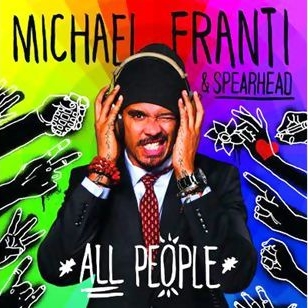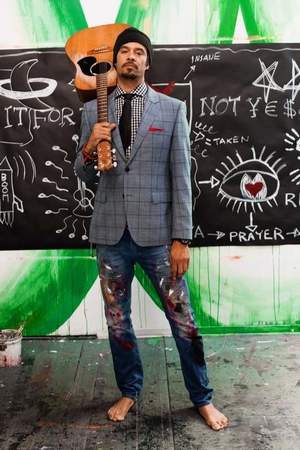| |
Taken from SF Weekly (Oct 9, 2013)
Michael Franti's All People: Blasting Good Vibes, But Provoking Bad Ones
by Ian S. Port

Photo by Lauren Dukoff |
Unequivocated, unself- conscious, uncynical positivity is the prevailing theme of All People, the latest album from San Francisco pop-reggae singer Michael Franti, and the result is 40 minutes of music that will make you loathe the idea of happiness. At least that's what Franti's new record does to me. Its trite melodies, annoying EDM club-throb, and tepid lyrical platitudes about brighter days, the sound of being alive, just wanting to be with you, all night long, etc., feel like someone trying to force you to smile so they can superglue it wide open.
Not that I enjoy not enjoying it. Franti is, by all accounts, a really good guy — at least in that organic, empathetic Bay Area way: He goes barefoot to protest or "raise awareness" of the poor people around the world who don't have shoes, and made a documentary in 2004 about the horrible costs of war in the Middle East. He put on the free Power to the Peaceful festival in Golden Gate Park until 2010. He seems to mean well.

Photo by Lauren Dukoff |
But being likable isn't the same as being good, and Franti's new album could be a case study in how music that works doggedly in one mood can utterly fail to inspire it — and even provoke the opposite feeling. On All People, Franti takes cheerfulness as a given, pressure-washing the listener in happy sounds rather than persuading them to the feeling itself. If you aren't listening to this on the most optimistic day of your life, you probably won't make it past the first three songs: Opener "All People" is a high-gloss romp with steam-blowing EDM beats grafted onto the choruses, its lyrics as obsessively general and vaporous as its title suggests. "11:59" tries to conjure hip-hop and reggae, but between its "one love" refrains and cliched, bucket-kicking chorus ("If I'm gonna die tonight/ I want heaven"), it sounds like the work of a fifth-rate Marley wannabe. "I'm Alive (Life Sounds Like)" is all percussive enthusiasm: whistling and handclaps and that polycarbonate electronic kick drum pounding away again. Cover your ears for the bridge, when Franti references Train's "Hey, Soul Sister," scorching all sonic earths in his quest for a positivity of mass description.
If you do make it this far, you'll land at the album's best song, the understated electronic ballad "Long Ride Home," where Franti for once addresses a single, possibly real person, rather than All People Everywhere. This is also the album's most melancholy tune (though it's not exactly sad), offering up snapshots of an escapist cross-country road trip: a bus of hippies "drinking forties and rolling up some sticky-icky," muscle cars "smoking up the boulevard." There's a poetry in these specific images, and the song's frame of them being shared between two people, that Franti never achieves in his more general, here-is-the-whole-world-today-type songwriting. So "Long Ride Home" confirms what many, especially listeners in the Bay Area, have known for a while: Franti is a talented artist, one who can make his unchallenging, upbeat music evoke genuine feelings in listeners. The failure of All People is that Franti assumes those feelings are there from the start.
|
|